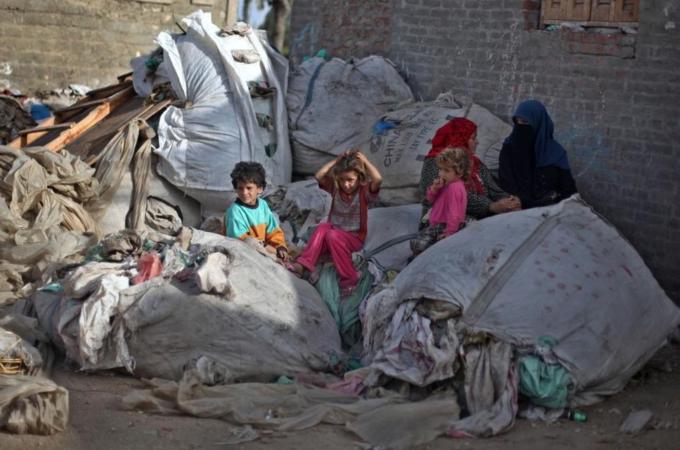While Palestinians commemorate the 1948 “ethnic cleansing” of Palestine – the Nakba – the “catastrophe” neither started that year nor has it ended. The Palestinian people have suffered for generations. Today, they continue to be treated as second class citizens in their own homes, denied basic rights of mobility and secure livelihoods in the occupied Gaza Strip and the West Bank and live precariously in refugee camps in Lebanon, Syria and Jordan.
The Egyptian role in Palestine has historically differed from its Arab neighbours. In 1948, Egypt was the only country to close its borders to Palestinians, out of a principled interest in keeping Palestinians within their nation. The policy was in some ways long-sighted, as many of those who fled in 1948 have not been allowed to go back. It has often been suggested that the relative dearth of Palestinians in Egypt, or the higher socio-economic status of this group, could be attributed to this policy.
Palestinian refugees in Egypt
Recently, however, Arab activists have stumbled upon a sizeable group of 1948 Palestinian refugees in Egypt. A few months ago, a group of four Palestinian and Egyptian friends came across the mention of a mass exodus of Palestinians from Bir il-Saba’ village in 1948; the refugees were said to have gone to Egypt. The friends found it strange, as they and others had persistently inquired about the existence of Palestinian refugee groups in Egypt at the Palestinian embassy and organisations in Cairo. They called on others to help them locate this community, which they eventually tracked down.
A few hours north of Cairo, in the Nile Delta governorate of Sharqiya, is the village of Gezirat Fadel. It is aptly named “Gezira” – island – because of its physical isolation at the time of its foundation, and Fadel after the name of one of the founders of the village. For the past 65 years, this village has been almost completely off the radar, by choice or ignorance, of any institution – whether be it the Egyptian or Palestinian authorities, non-governmental organisations or activists.
Neither the village nor the people are officially recognised by the Egyptian government, and thus the informal village is left with no infrastructure or public services, and the people with no basic rights – not even official refugee status. Since locating the village, the friends have visited it several times, gathering information on its history and current conditions, and have been lobbying Arab and Egyptian media to shed light on the neglected community.
For the anniversary of the Nakba, they called on other activists to join them to visit Gezirat Fadel, to commemorate the occasion and convey the simple message that this community of refugees would not be forgotten. As Syrine, a Palestinian activist from Jerusalem, put it: “These people, the refugees, are the biggest victims of the Nakba. They are the ones we should commemorate it with.”
I joined over 80 activists, who were predominantly Egyptian and Palestinian, but included Swedes, French, Iranians and others. On an early Friday morning, the buses drove out of Cairo, past the lush Delta fields, through the busy Sharqiya capital of Zaqaziq, and on to a dirt road that eventually became too narrow for the buses to continue.
The activists descended from the buses with dozens of Egyptian and Palestinian flags in hand and a banner that read:
“In memory of the Nakba, Gezirat Fadel will no longer be forgotten. Egypt and Palestine, one people, one struggle. From Egypt to Palestine, the revolution continues and will prevail. We will return, one day, to Bir il-Saba’.”
As we walked towards the village, the path, filled with rubbish and lined with mud brick walls, was an indicator of what lie ahead. After a 20-minute walk, clay houses and Palestinian flags waving from hay rooftops appeared. The villagers, overwhelmingly young children, were excited by the news of visitors and lined the streets, Palestinian kufiyas draped from their necks and greeted us in their mixed rural Palestinian-Egyptian dialect.
While the trip was primarily humanitarian in purpose – the group came with toys for the children and doctors who paid house visits – the political nature of it was effusive. Though the organisers insisted upon the independence of the initiative, the identity of involved activists as core actors from the ongoing Egyptian revolution was belied either subtly or quite explicitly as it appeared on the banner. The ideals of the Arab uprising – ones that insist uncompromisingly on freedom and social justice – translate very directly into political stances which in the case of Palestine not only oppose Israeli forces’ brutality, but also reject intermediaries and facilitators of ongoing occupation and displacement, Palestinian authorities included.
Mired in poverty
In Gezirat Fadel too, politics was palpable. It became starkly apparent throughout the day that the isolation of this village has nothing to do with geography or ignorance, but rather has been constructed by Egyptian and Palestinian authorities and beneficiaries.
As we entered the village, we were greeted by a village head, the “omdeh“. One of the few educated members of the village, he works in Cairo and dressed in a suit that contrasted with a population where village elders were donned in traditional Palestinian dress and others in simple, often tattered clothing.
Standing on an elevated veranda before the villagers and visitors, the omdeh proceeded to warmly welcome the activists and referred to the Nakba as a celebration, a marker of the day that Palestinians will return to their homes, with all the embellishments of Arab oratory. The omdeh described the village in shining terms, claiming that villagers earn decent incomes and thanked for the support from Palestinian authorities and the Egyptians who have welcomed them as “guests”.
The performance stood in stark contrast to the private interactions of the omdeh with organising activists and with the realities of village life. The refugee audience was markedly acquiescent as the omdeh spoke. Among the crowd, an event organiser spotted an employee from the Palestinian embassy in Cairo.
The activists had brawled with the employee days before in Cairo, over the embassy’s persistent denial of the existence of a Palestinian refugee community in Egypt, despite evidence that the embassy had direct ties with the village omdeh and that the ambassador had himself paid a visit to the community. The activists have also had a turbulent relationship with the omdeh since first visiting the village; the omdeh had initially threatened the activists, telling them that he would inform Egyptian intelligence services if they returned to Gezirat Fadel.
The omdeh‘s remarks were incongruent with observations of village life. The conditions in which the Palestinians of Gezirat Fadel live are nothing short of appalling. The village is home to over 3,000 people. Other than a “guest building” – which consists of a large room that is used for community gatherings and is internally adorned with a banner thanking Palestinian Authority President Mahmoud Abbas for his contributions to the community – the village contains literally no public services. To say that the village was marked by poverty would be an understatement – on the way to the village, I spotted a young boy retrieving a tattered shirt from a pile of garbage and sewing it together to wear.
While the Gamal Abdel Nasser government had extended state services to Palestinians in Egypt, making it possible for Gezirat Fadel villagers to use state institutions at the same free or highly subsided prices offered to Egyptians, these rights were revoked in the Sadat era. The refugees must pay international fees to access most basic services; they have no right to property ownership.
A majority of the villagers are employed as day labourers on large tracts of land owned by Egyptian companies or families, as mechanics or in small shops in neighbouring villages, or collect and sort garbage. Donia, a 12-year-old refugee who walks for two hours each morning to join a reading class in a neighbouring village, said she aspires to work “for anyone who will employ me”.
While some mentioned the lack of legal rights, they were quick to thank Egypt for hosting them for so long. The hardships of their present lives were masked with evocations of their lost homeland. While most villagers have never laid eyes on Bir il-Saba’, even the youngest children describe it vividly, adding illustrative accounts of the night their grandparents were bombarded by Israeli fire in 1948, listing the death of relatives and recounting the journey to Egypt.
“We are Palestinian guests in Egypt, and will one day return to Bir il-Saba’,” was an unprompted phrase echoed by villagers of all ages. Eight-year-old Samih offered to show me his grandfather’s olive tree seeds, which he definitively told me that he will one day plant outside his family home in Bir il-Saba’.
Manipulation of power
While the population of many Egyptian villages may suffer from stark inequality and poor services, it seems particularly exasperated in the Palestinian case.
Basic rights for Palestinian refugees have often been presented by Arab officials as a contributor to resettlement, counter-productive to the right of return. What is apparent, though, is that these same institutions, while loudly touting their nationalism and dedication to the Palestinian cause, are largely removed from daily hardships experienced by the refugees.
One activist from Ramallah lamented the irony in the statements of Gezirat Fadel refugees who linked any hardships to a greater national cause and expressed pride in PA President Abbas, while in his home city political elites live relatively luxurious lives.
The link between personal interests and political institutions is a phenomenon that continues to have a real impact on people’s livelihoods in the Arab world. In the case of the Palestinian refugees, this is often intense, as in addition to community dynamics and Palestinian leadership, host countries add a layer of complication.
In the context of the Arab uprising, people are recognising and openly rejecting this manipulation of power. Despite the omdeh‘s threats, activists returned to Gezirat Fadel, openly challenged his statements in front of villagers and refused his monopolisation of the story of the refugee experience.
While for 65 years the right of return has been, and will continue to be, the essential demand of the Palestinian refugees, there is an evident need for an extension of basic rights to a community that suffers exponentially due to the politicisation of its identity. Arab governments’ hypocritical lip service to the Palestinian cause has long been transparent; Arab activists are now determined to bring it to an end.
Sarah Mousa graduated from Princeton University’s Woodrow Wilson School of Public and International Affairs in 2010, and was a 2010-2011 Fulbright Scholar in Egypt. She is currently a graduate student at the Center of Contemporary Arab Studies at Georgetown University.
Source: Al Jazeera














